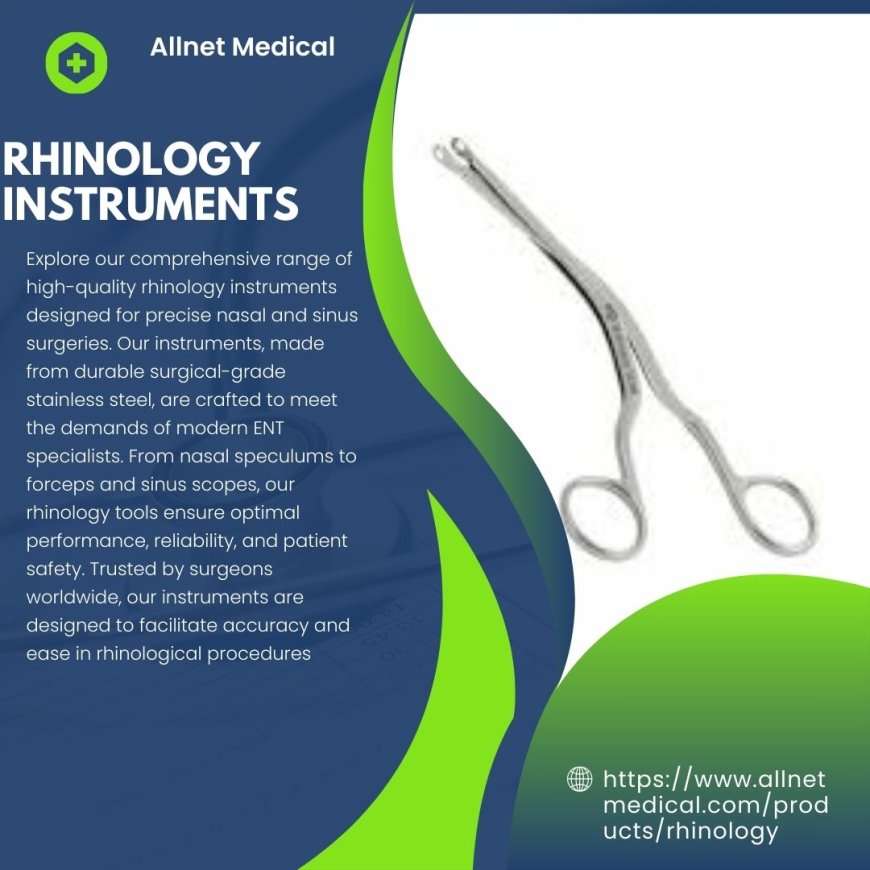The Future of Rhinology: Advancements and Innovations
and Innovations Rhinology is a specialized field in otolaryngology that focuses on the diagnosis and treatment of diseases related to the nose and sinuses. As medical technology continues to advance, the future of rhinology is poised to bring significant innovations, particularly in the development of rhinology instruments and surgical techniques.

The Future of Rhinology: Advancements and Innovations
Rhinology is a specialized field in otolaryngology that focuses on the diagnosis and treatment of diseases related to the nose and sinuses. As medical technology continues to advance, the future of rhinology is poised to bring significant innovations, particularly in the development of rhinology instruments and surgical techniques.
Emerging Technologies in Rhinology
The future of rhinology is being shaped by cutting-edge technologies that are revolutionizing how surgeons approach nasal and sinus conditions. The integration of robotic-assisted surgeries, endoscopic advancements, and artificial intelligence are changing the landscape of this field. These innovations are not only improving the precision of surgical procedures but also enhancing patient outcomes and recovery times.
Rhinology Instruments: Precision and Innovation
The design and development of rhinology instruments have progressed significantly over the years. In the future, we can expect even more precise and minimally invasive instruments to become standard in surgical settings. Endoscopic tools, for instance, are becoming smaller and more flexible, allowing surgeons to access hard-to-reach areas of the nasal passages. This level of precision reduces the risk of complications and speeds up the healing process.
Artificial Intelligence in Rhinology
Artificial intelligence (AI) is set to play a pivotal role in the future of rhinology. AI-driven software can analyze patient data more effectively, leading to accurate diagnoses and personalized treatment plans. In the future, AI may assist surgeons during procedures by providing real-time feedback and predicting outcomes based on patient-specific data.
Robotic-Assisted Surgery
Robotic-assisted surgery is another area where rhinology is seeing rapid growth. Robotic systems allow for enhanced dexterity and precision, enabling surgeons to perform complex procedures with minimal invasiveness. These systems are expected to become more common in rhinology, particularly for intricate nasal and sinus surgeries.
3D Imaging and Navigation Systems
Advancements in 3D imaging and navigation systems are making rhinology surgeries more accurate and safer. Surgeons now have access to detailed images of the nasal structures, allowing them to plan and execute surgeries with greater precision. In the future, these technologies will become even more sophisticated, further improving patient outcomes.
Patient-Centered Care and Customization
The future of rhinology will likely see a shift toward more personalized care. Customizable rhinology instruments and tailor-made treatment plans are expected to become the norm. This approach ensures that each patient receives the most effective care based on their unique anatomy and medical history, leading to better results and satisfaction.
Conclusion
The future of rhinology is bright, with significant advancements in rhinology instruments, robotic-assisted surgery, and artificial intelligence leading the way. These innovations promise to improve both the precision of surgical procedures and patient outcomes, making rhinology an exciting field to watch in the coming years. As technology continues to evolve, so will the tools and techniques that drive the future of this essential medical specialty.For more information: Allnet
What's Your Reaction?













![Tranquil Blend CBD Gummies [Price UPDATED 2024] - Cost Solves](https://news.bangboxonline.com/uploads/images/202412/image_430x256_676d404cc1dc0.jpg)












